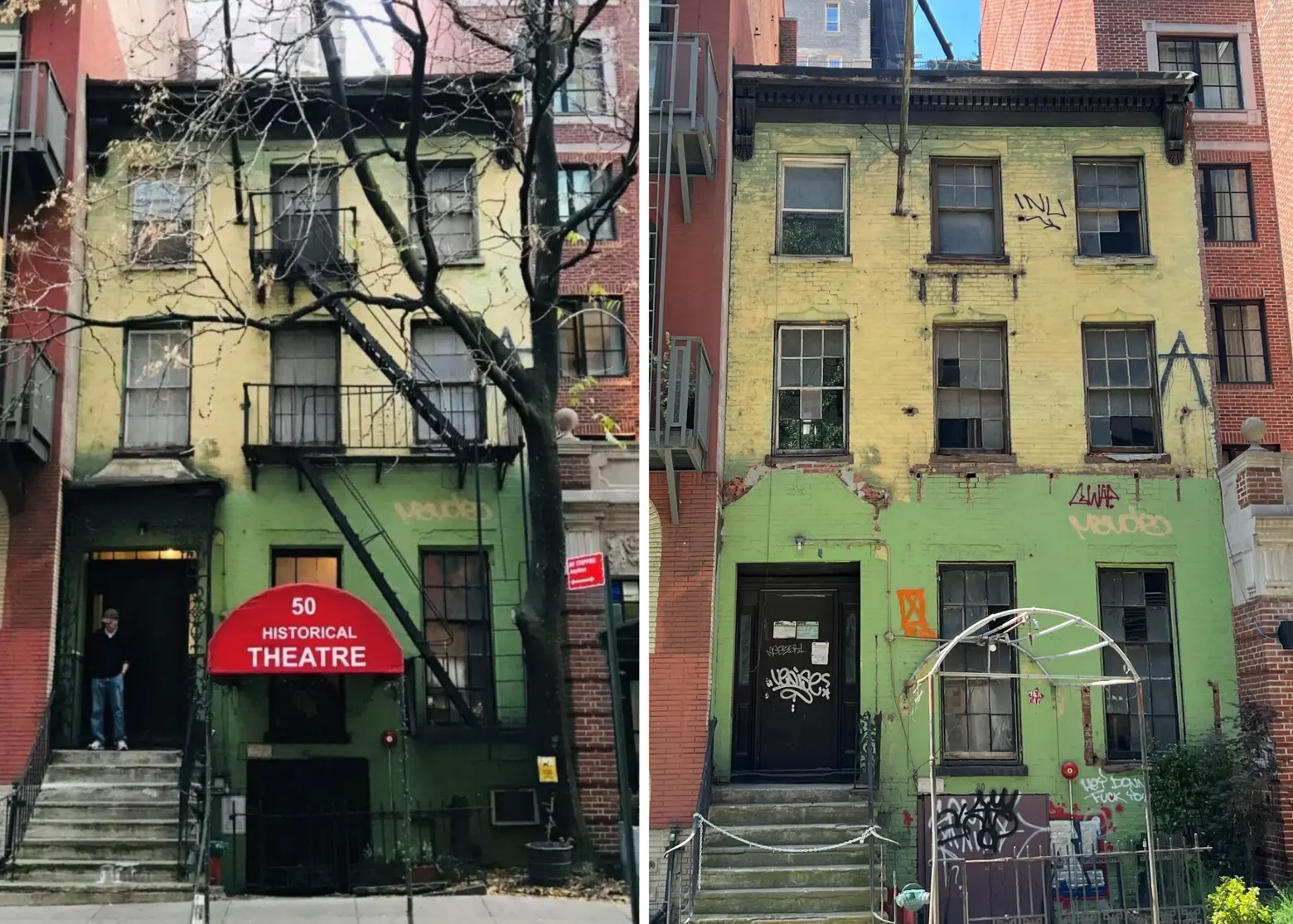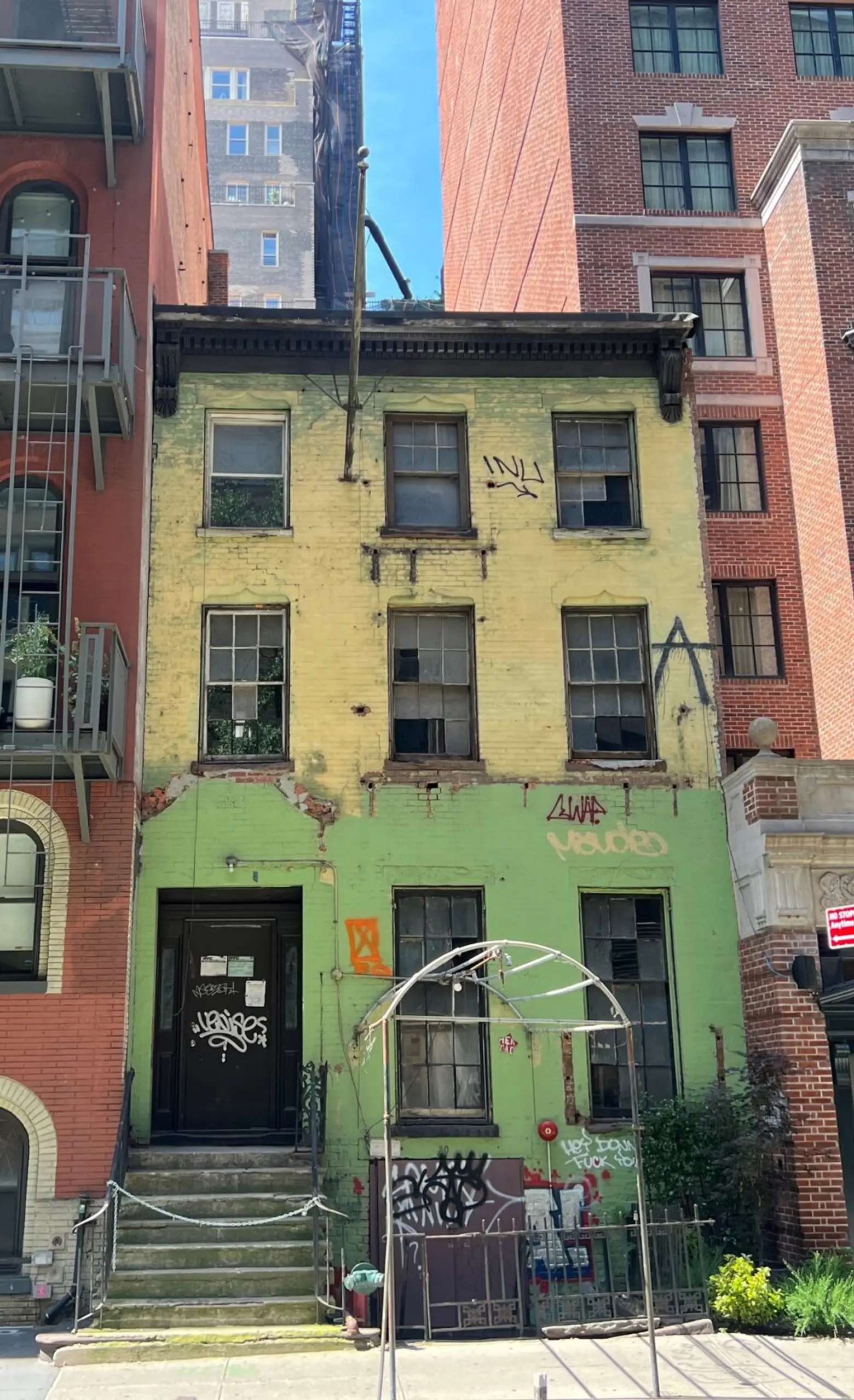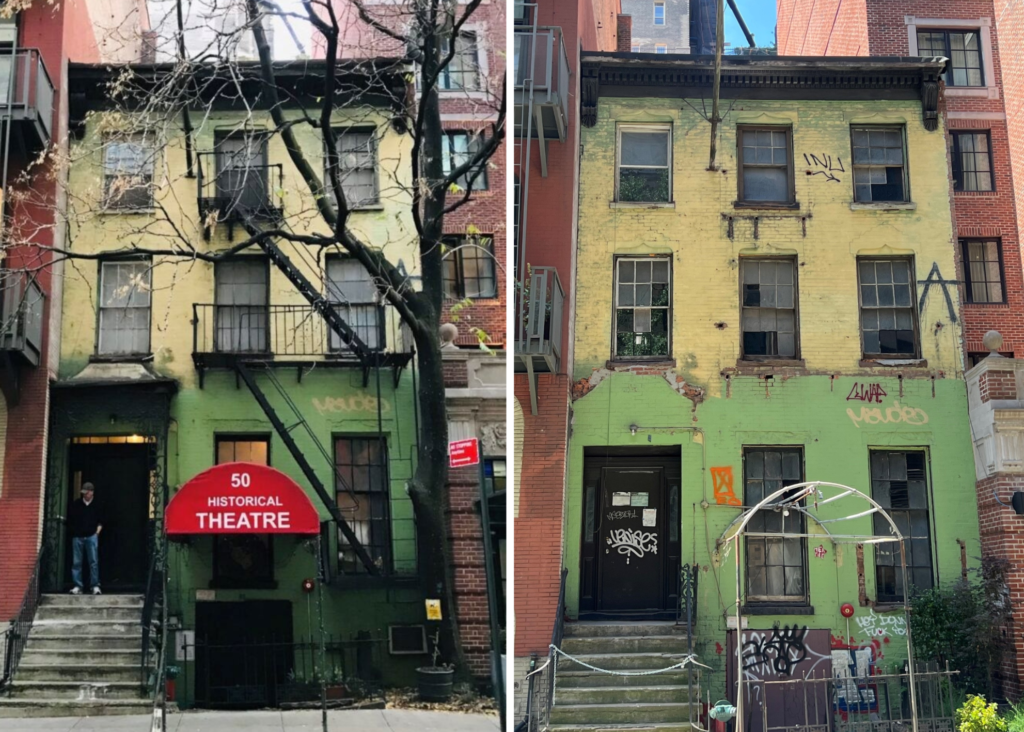
13th Street Repertory Company. Photo (left): Courtesy of Village Preservation. Current state of the building (right): Courtesy of Landmarks Preservation Commission.
A nearly 180-year-old row house in Greenwich Village, once one of New York City’s first “off-off-Broadway” theaters and deeply connected to black history, may be spared from demolition. The Landmarks Preservation Commission voted Tuesday to preserve the Jacob Day House at 50 West 13th Street as a landmark. Built in 1845, the row house was once home to one of New York City’s most successful African-American businessmen, a well-known women’s suffragette and civil rights leader, and more recently the 13th Street Repertory Company. Initially, the LPC told preservationists that the building was not distinctive enough to merit the designation, but subsequent studies have proven the building’s immense cultural and historical importance, and now the row house is one step closer to becoming a landmark.
Built circa 1845, the three-story Greek Revival brick townhouse was the residence of Jacob Day, one of the city’s wealthiest and most successful 19th-century African-American businessmen and property owners, from 1858 to 1884. Day was known as an abolitionist, civil rights advocate, and supporter of African-American organizations.
The building was also home to Edith O’Hara’s 13th Street Repertory Company, which she opened in 1972. One of the city’s oldest Off-Off-Broadway theaters, it helped launch the careers of many stars, including Bette Midler, Chazz Palminteri, Richard Dreyfuss, and Barry Manilow. Following O’Hara’s death in 2020, Village Preservation launched a campaign to save the building from demolition.
“It’s a unique story about this prominent African-American abolitionist and wealthy businessman, something that’s rare in this neighborhood,” LPC Chair Sarah Carroll said Tuesday, “and it’s a story that’s not well represented in many of the historic structures that exist.”
With work at 50 West 13th Street completed on schedule, the building’s current owners will need to work with LPC on a number of repair or renovation projects.
Born in 1817, Jacob Day worked as a waiter and saved enough money to start his own catering business, gradually working his way up to become one of the wealthiest black people in New York at the time, with a net worth of about $200,000 at the time of his death, the equivalent of $6 million in today’s money, LPC staff member Terry Newman said during Tuesday’s hearing.
Day was a staunch supporter of black civil rights throughout his life, and although there is no certainty, historians believe he played an active role in helping enslaved people escape north via the Underground Railroad.
Evidence supporting this theory includes, according to The New York Times, that Day met with Underground Railroad leaders for at least 26 years, and that Day’s name appears on a document showing a land deed from Gerrit Smith, a key Underground Railroad figure, in the Adirondack region of upstate New York. Day later owned property in Brooklyn and on Long Island. Additionally, a trap door in the theater’s dressing room leads to a hidden basement that is not connected to the rest of the basement.
Mr. Day was also a member and long-time treasurer of the Abyssinian Baptist Church, the second-oldest black church in New York City, and had an account with the Freedman Savings Bank, an institution established after the Civil War to assist former slaves.
Sarah Tompkins Garnett, a prominent women’s suffragist, educator and civil rights leader, lived in the building as part of the Day family from 1866 to 1874. Tompkins was one of the first black women to become a principal in the city’s school system.
In 1958, the building was converted from retail and manufacturing space into a theater in the basement and on the first floor. The original theater was called the Washington Players Studio and was established at the beginning of the so-called “Off-Off-Broadway” movement.
According to Village Preservation, the theater hosted monthly plays and acting classes, and later, in 1968, hosted an African-American folk theater troupe that performed poetry, prose, and folk tales.
In 1972, O’Hara founded the 13th Street Repertory Company, which remained in business until her death in 2020. The theater was renowned for giving a stage to up-and-coming talent and allowing actors and writers to work in a free atmosphere.
Bill Solly’s Boy Meets Boy was the city’s first gay musical and was rejected by other New York City producers but taken a chance on by O’Hara. Israel Horowitz’s play The Line, which O’Hara originally directed at the theatre, is the longest-running play in New York City.
Village Preservation began its preservation efforts after O’Hara’s death. The commission told the group that although the row house had historic value, its architecture did not qualify for landmark protection. Village Preservation investigated the building to prove it merited landmark protection, not only for its theater history but also for its ties to black history.
The group also collected thousands of letters in support of the landmark designation from New Yorkers, elected officials and people across the country who care about black, women and theatrical history preservation.
 50 West 13th Street today. Image courtesy of LPC
50 West 13th Street today. Image courtesy of LPC
The building has fallen into disrepair over the past 15 years due to a lack of funding, another factor driving the urgency of landmark designation. According to The New York Times, the building is currently owned by White Knight LLC, with a third of the property owned by O’Hara’s three children and the rest owned by bookseller Stephen Lowentheil and his ex-wife, Beth Ferber.
After years of legal battles, the O’Hara family and Lowentheil agreed to let the theater remain intact until O’Hara’s death, after which the theater’s fate was uncertain.
“We are thrilled to learn that this fragile, neglected building with such a proud and rich history may finally be protected and preserved,” said Andrew Berman, executive director of Village Preservation. “After nearly four years of effort, the City has finally taken the first steps to protect this historic landmark that is so deeply connected to our city and country’s oft-forgotten Black history, the history of the Civil Rights Movement, the women’s suffrage movement, and of course our theatrical and cultural history.”
“With 180 years of history, 50 West 13th Street is truly a landmark, and we are thrilled that it will now be recognized and potentially receive the permanent protection it needs and deserves.”
The proposed landmarks will be reviewed at a public hearing and then voted on by the commission.
Related:


